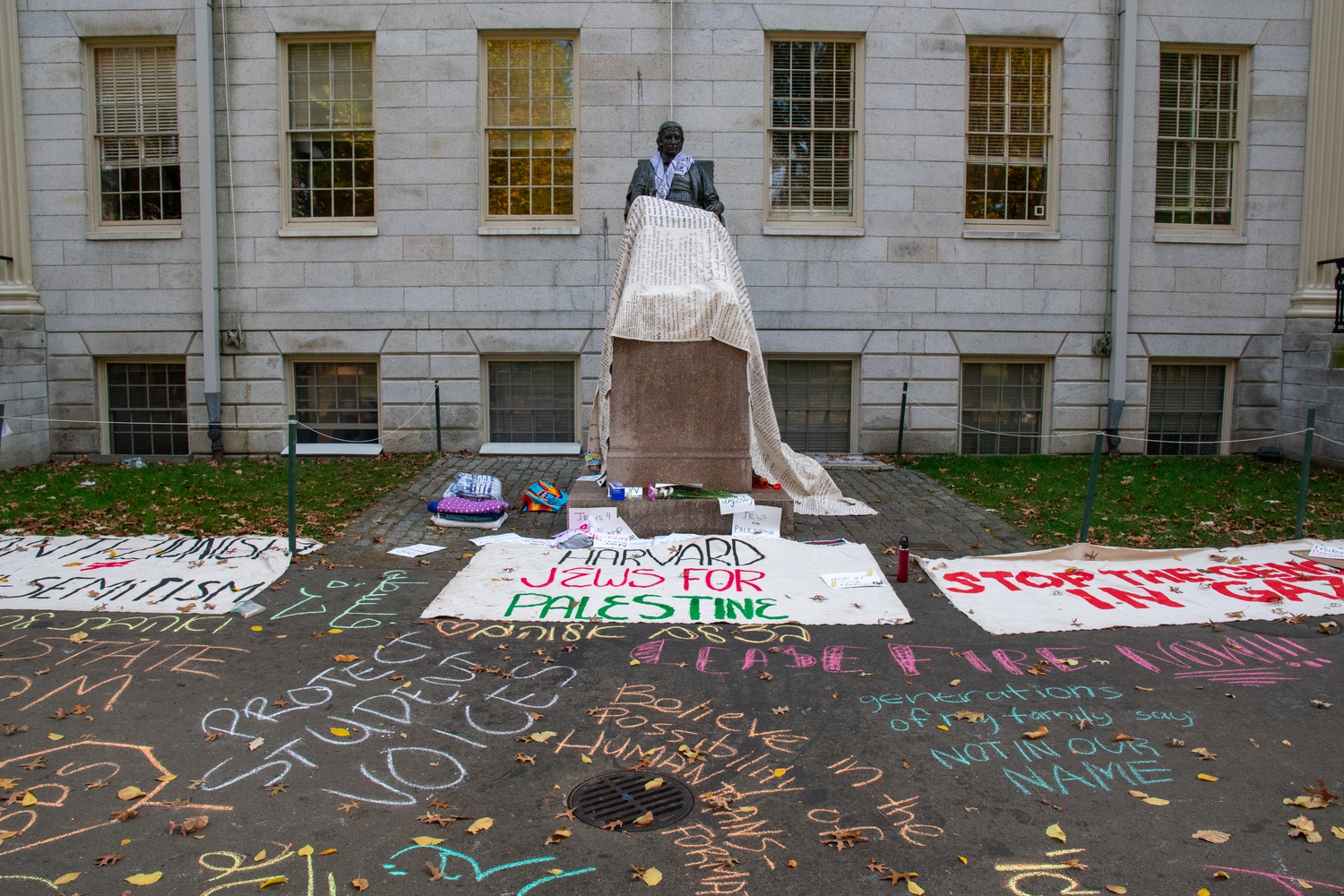
News
Pro-Palestine Encampment Represents First Major Test for Harvard President Alan Garber

News
Israeli PM Benjamin Netanyahu Condemns Antisemitism at U.S. Colleges Amid Encampment at Harvard

News
‘A Joke’: Nikole Hannah-Jones Says Harvard Should Spend More on Legacy of Slavery Initiative

News
Massachusetts ACLU Demands Harvard Reinstate PSC in Letter

News
LIVE UPDATES: Pro-Palestine Protesters Begin Encampment in Harvard Yard
Confessions of the Apathetic Activist

Navigating adulthood is one thing. However, navigating adulthood while actively striving for long-lasting change — whatever this means to you, dear reader — is another beast entirely.
We — the youth — have historically been known for our distinct role in nudging this country towards the expansion of social justice and the confrontation of wrongs. In particular, college campuses have functioned as a unique and integral stage for leveraging the right to protest and free speech.
Dwelling on the picket signs and tracks of walkouts that have touched my own institution’s soil, I think of the University Hall takeover of 1969. But I also reflect on the recent demonstrations of my peers, such as the “die-in” last October and the occupation of University Hall the following month.
Indeed, the spirit of late Congressman John R. Lewis’ “good trouble” continues to flicker, running deep in the blood of my generation.
Nevertheless, does students’ spunk ever run dry? I must confess that this passion can unquestionably dwindle, a phenomenon that is different from the burnout faced by activists.
Identified by social scientists, burnout encapsulates an array of clear-cut emotional, and even physical, symptoms of exhaustion. As scholarship on activist fatigue continues to take shape, there is another conversation that must be had — especially regarding those on the other side of the picket line.
I am pointing to those that simultaneously observe demonstrators while advocating from afar: the quiet, yet certainly not voiceless, individual. Their hearts lie with those at the frontlines, but their actions remain miniscule in comparison to those of whom they admire.
Surely, they find themselves in a state of privilege — not facing the same risks of safety of those on the front lines of protests. Still, this state of motionless support breeds a distinctive burnout. It is the burnout of these observers that jeopardizes the sustainability of a social movement.
Like many Harvard undergraduates, I frequently find myself bustling across campus to class. And often, especially this year, this venture meant walking past the notorious John Harvard Statue, and consequently, the occasional masses of my peers leveraging their freedom of speech.
Whether they are protesting distinctly campus-related issues, or larger conversations concerning the state of our nation and world, there is a sense of apathy that manifests itself in this “passing.” In a matter of seconds, many work through the mental calculus of deciding what to prioritize and, in turn, what to overlook rather than overcome.
In these moments, I find myself at odds with my principles.
I’m weighing the Harvard student’s anal type-A attitude in fear of missing lecture against a moral compass that resonates with the protest in front of me — but suddenly, the tension ceases to be as a wave of apathy washes over me.
Yes, this is injustice, I tell myself. Tempted by the all too common notion of things never changing, I am inclined to believe that it should simply be left as such. Yet it is this demagnetization of the needle in one’s moral compass that prevents a movement from flourishing.
The bystanders, the observers, the watchers, and the whisperers need not feel guilty in the face of this reality. It is not their silence in the face of adversity that raises a moral red flag — it is their loss of hope.
It is overwhelming to just look at injustice — to name it.
I am certainly not placing the expectation of others to miraculously join nearby protests and demonstrations. Nor am I stating that it is essential for one to partake in a demonstration to truly stay true to one’s moral compass. Such expectations would be unrealistic, even for myself. But, I do believe that we have an obligation to verbalize our principles into existence by acknowledging the protesters. It is these discussions of the very real issues to which they draw our attention that will ensure our principles survive. For we are the quiet embers, a community, that are essential to the upkeep of the flame — one of justice and historical struggle for change.
Lauren A. Kirkpatrick, a Crimson Diversity and Inclusion Chair and Editorial Editor, is a philosophy concentrator in Mather House.
Want to keep up with breaking news? Subscribe to our email newsletter.
